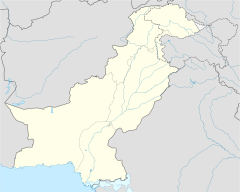Datta Khel airstrike
| Datta Khel airstrike | |
|---|---|
| Part of War in North-West Pakistan | |
| Type | UAV-strike |
| Location |
Datta Khel, North Waziristan, Pakistan 33°09′N 70°26′E / 33.15°N 70.43°ECoordinates: 33°09′N 70°26′E / 33.15°N 70.43°E |
| Target | Taliban fighters |
| Date | 17 March 2011 |
| Executed by | CIA |
| Casualties | 44 killed 10 injured |
The Datta Khel airstrike was an American airstrike carried out on 17 March 2011 in Datta Khel, North Waziristan that killed 44 people and led to widespread condemnation in Pakistan. Sherabat Khan Wazir, a top commander of Hafiz Gul Bahadur's Taliban faction, was killed in the strike, and in response Bahadur threatened to end the peace deal struck with the Pakistani government almost four years earlier. The airstrike was part of a long series of drone attacks in Pakistan carried out by the CIA and United States military. It occurred just two days after diyya, a form of compensation paid to a victim's family under Islamic law, was paid for the release of U.S. CIA operative Raymond Allen Davis, signaling a resumption of U.S. activity after a several week hiatus while Davis' pardon on murder charges was being negotiated.
According to Pakistani intelligence officials, the attack targeted a compound where several dozen people believed to be Taliban militants linked to Hafiz Gul Bahadur were meeting. On 17 March 2011, two or three missiles were fired within three minutes, killing at least 44 people and injuring around fifteen others. A security official in Peshawar said that the building that was attacked was used as a training location and meeting place for militants. A car that was transporting additional suspected militants near the location of the primary target was also fired upon.
Of those killed, a Pakistani security official said that eleven Taliban personnel were killed in the attack, while the remainder were civilians. According to a local tribesman, however, the suspected militants were actually a group of tribal elders from a nearby village who were having a business meeting. The meeting was said to be regarding the disputed sale of a chromite mine in the area. The tribesman said that a commander loyal to Bahadur, Sharabat Khan, was present, but only because he was also a tribal elder. Khan was reported to have been killed in the attack. After the attack the Taliban faction led by Hafiz Gul Bahadur threatened to cancel the peace deal with Pakistani government to protest the governments inability to halt drone attacks.
...
Wikipedia

